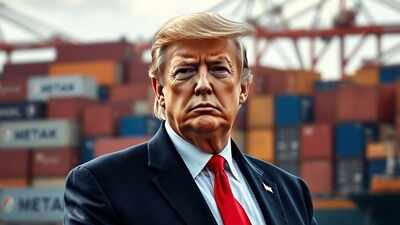‘Give your best offers by…’: Donald Trump administration pushes countries to urgently finalise trade deals as tariff deadline looms | Business

The Donald Trump administration has issued a new ultimatum to countries to share their best offers on trade deals by Wednesday, five weeks ahead of the day when the reciprocal tariffs are set to kick in. A draft letter, originating from the United States Trade Representative’s office, reveals Trump’s strategy to conclude extensive trade negotiations with many countries. Whilst the recipients weren’t specified, the correspondence targeted nations actively participating in discussions involving meetings and document exchanges. The United States has been conducting such discussions with several partners, including the European Union, Japan, Vietnam and India.These talks commenced on April 9 when he suspended his “Liberation Day” tariffs for a 90-day period until July 8, following adverse reactions in the stock, bond and currency markets to the comprehensive nature of these duties.US in a rush on trade dealsAccording to a Reuters report, the Trump administration appears to be in a rush to finalise agreements before its self-imposed deadline expires. Despite consistent assurances from senior officials, including White House economic adviser Kevin Hassett, about multiple deals being close to completion, the United States has only managed to secure one agreement with a significant trading ally: Britain. However, this agreement primarily serves as a structure for future negotiations rather than a conclusive arrangement.Also Read | ‘Wait and watch…’: India, US working to give preferential market access to businesses, says Piyush Goyal on trade dealThe United States, as per the draft letter seen by Reuters, requires nations to present their best proposals across several crucial sectors. These include offers related to tariffs and quotas for acquiring US industrial and agricultural goods, along with strategies to address existing non-tariff obstacles. The correspondence seeks details about pledges concerning digital commerce, economic security, and nation-specific obligations.Within days, the United States plans to assess the replies and propose ‘a possible landing zone’ that might incorporate a mutual tariff arrangement.A representative from USTR confirmed ongoing trade discussions, stating: “Productive negotiations with many key trading partners continue at a rapid pace. It is in all parties’ interest to take stock of progress and assess any next steps.”Tiffany Smith, National Foreign Trade Council’s vice president of global trade policy, expressed approval of the USTR initiatives.“We are encouraged that USTR is moving negotiations ahead as quickly as they can,” she told Reuters, noting that trade agreements eliminating obstacles for American businesses overseas whilst reducing US tariffs would be “a win-win if they are done in a way that returns predictability and stability to trade relationships.”Also Read | Will the Donald Trump administration be forced to give billions of dollars in tariff refunds?US warns trading partners to ignore court verdictThe tariff strategy, a cornerstone of Trump’s “America First” economic programme, aims to transform US trade partnerships, decrease trade deficits and safeguard American industries. Republican politicians anticipate that tariffs will boost federal income and counterbalance the expenses of tax reduction legislation currently under congressional review.The impact of Trump’s tariff decisions has significantly affected market performance. During May, US stocks achieved their most substantial gains since November 2023, following a period of sharp declines in global markets due to Trump’s successive tariff declarations throughout February, March and early April.Questions have emerged regarding the legal validity of the methodology employed in implementing his most extensive tariff measures.On Wednesday last week, the International Trade Court determined that Trump had exceeded his legal authority regarding tariffs implemented under the International Emergency Economic Powers Act, encompassing the “Liberation Day” duties and previous tariffs on Canadian, Mexican and Chinese goods, linked to Trump’s claims about these nations enabling fentanyl trafficking into the United States. The following day, an appeals tribunal temporarily suspended this ruling. The disputed tariffs are anticipated to remain active whilst legal proceedings continue.The proposed correspondence to trade allies cautions against assuming the tariffs would cease if courts rule unfavourably regarding Trump’s IEEPA application.The draft states: “Regardless of ongoing litigation concerning the President’s reciprocal tariff action in U.S. courts, the President intends to continue this tariff program pursuant to other robust legal authorities if necessary, so it is important that we continue our discussions on these matters.”Also Read | ‘Work of fiction…’: Will Donald Trump bury US government in debt with multitrillion-dollar tax breaks? Even Elon Musk is concerned





